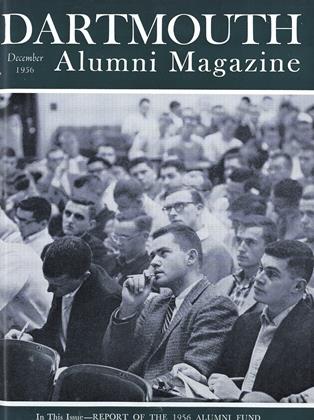The Kosciuszko Foundation on October 21 honored Eric P. Kelly '06, Professor of Journalism, Emeritus, at Dartmouth, with its Medal of Recognition for Distinguished Service to Polish and American Culture. Because of ill health, Professor Kelly received the medal at a ceremony at Chebeague Island, Me., where he lives, rather than at a scheduled New York dinner. Dr. Stephan P. Mizwa, director and president of the Foundation, presented the award to Professor Kelly for his work for Free Poland which has covered a period of nearly forty years.
Professor Kelly is the second person to be honored thus by the Kosciuszko Foundation, with which he has been associated since 1925. In that year the Foundation sent him to the University of Krakow to lecture on American literature and institutions and to learn about the literature and traditions of Poland. His introduction to the Poles, however, began in World War I when he served Polish soldiers as head of the "Foyer de Soldat," the French YMCA. In the troubled year of the Polish-Bolshevik War of 1920, he again served Polish soldiers from a traveling YMCA canteen. At that time he persuaded the head chaplain of the Haller army of the good the organization might do in Poland, a Catholic country, and to him belongs much of the credit for introducing the YMCA there.
During World War II he was again able to aid the Poles when he was chosen by the State Department's Office of Foreign Relief to supervise a Polish refugee cooperative town in Leon, Mexico. Professor Kelly left Dartmouth for four years to aid this tragic group of exiles — 1600 in all, made up mostly of children, many of whom were orphans who were so young when they escaped from Poland they did not know their own names. For his assistance to the group in providing housing, food and hospitalization, he was honored with the "Commander's Cross of the Order of Polonia Restituta," one of the highest honors conferred by the Polish government, then in exile in London.
A well-known writer and popular author of children's books, Professor Kelly is familiar to many Dartmouth alumni who took his English courses. A newspaper reporter before World War I, he returned to Dartmouth as teacher in 1921, became Professor of Journalism in 1929, and taught here until he retired in 1954. His interest in writing and Poland made a fortunate combination for during his years at Dartmouth he wrote six books about Poland, one of which, "The Trumpeter of Krakow," won the 1928 John Newbery Medal for children's literature. Professor Kelly has been a prolific writer; at the time of his retirement, he had fifteen novels and countless short stories and articles to his credit. In addition to writing fiction, he was managing editor of the ALUMNI MAGAZINE from 1928 to 1932, and Associate Editor for ten years thereafter. In 1952 and 1953 he was chairman of the Pulitzer Prize Committee on the Novel.
The depth of Professor Kelly's faith in Poland and his devotion to its cause are expressed in these words of his: ' Poland s life, history and culture are in themselves unique, without parallel in the same phases of the existence of other nations. Nowhere in the world is the spirit of self-sacrifice so noble, nowhere in the world is national culture found to be so high and so sensitive, nowhere is to be found the same devotion as in Poland to things of the intellect or the spirit. To merge myself with these forces came with no effort and if the spirit of decency and fair-play and independence is ever to rule the world, the example will come from Poland."
Eric P. Kelly '06
 View Full Issue
View Full Issue
More From This Issue
-
 Feature
FeatureGOTHAM GAMBIT:
December 1956 By KIMBALL FLACCUS '33 -
 Feature
FeatureCLASS ACHIEVENTS, 1956 FUND
December 1956 -
 Feature
FeatureSTUDENT LOANS
December 1956 -
 Feature
FeatureTHE 1956 ALUMNI FUND
December 1956 By William G. Morton '28 -
 Feature
FeatureTONS OF MAPS
December 1956 By CLIFFORD L. JORDAN '45 -
 Class Notes
Class Notes1953
December 1956 By RICHARD C. CAHN, LT. (JG) EDWARD F. BOYLE, RICHARD CALKINS







